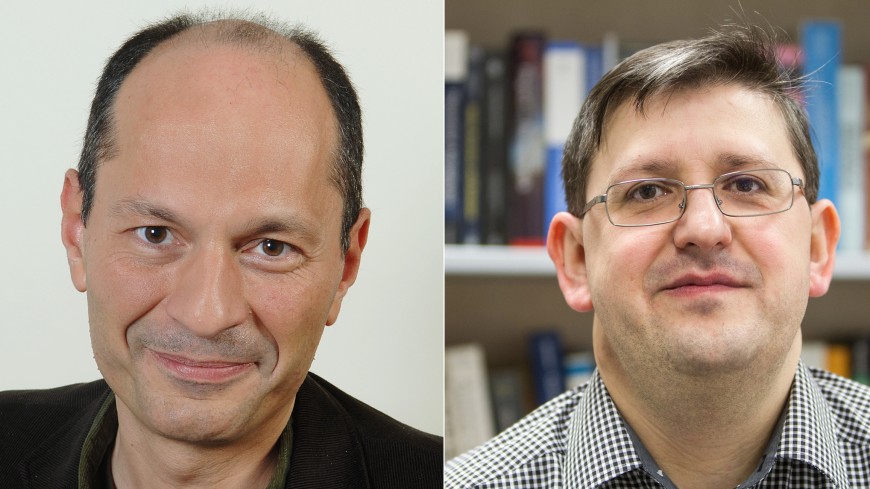Radiotherapy and nucleosynthesis
ERC Advanced Grants for TU Professors Durante and Martínez-Pinedo
2020/03/31
The two TU professors and GSI physicists PhD Marco Durante und Dr. Gabriel Martínez-Pinedo have each been awarded an ERC Advanced Grant. The prestigious research grant from the European Union underlines the outstanding quality of their scientific research. Research and teaching at TU will also benefit from these grants.

The two Advanced Grants from the European Research Council (ERC) have been awarded to researchers based at the GSI Helmholtz Centre for Heavy Ion Research in Darmstadt. The grants are funding and acknowledgement in equal measure: ERC Advanced Grants are exclusively awarded on the basis of the scientific excellence of the projects submitted and are aimed at established researchers from all disciplines whose highly innovative projects go considerably beyond the current state of the art and open up new areas of research. They are endowed with a maximum of 2.5 million euros of funding each over a period of five years.
“TU Darmstadt is also delighted for Professor Martínez-Pinedo and Professor Durante”, says Professor Dr. Barbara Albert, Vice President, Research and Early Careers, at TU Darmstadt. “The award of these prestigious ERC Advanced Grants is also recognition of the strong research partnership between the GSI and TU Darmstadt.”
An expert in the fields of radiation biology and medical physics
Marco Durante is a professor at the Institute for Condensed Matter Physics in the Department of Physics at TU Darmstadt and Head of the GSI Biophysics Research Department. He is an internationally recognized expert in the fields of radiation biology and medical physics, especially for therapy with heavy ions and radioprotection in space. In his new project titled “Biomedical Applications of Radioactive ion Beams (BARB)”, Marco Durante intends to further develop tumour therapy using charged particles. “Particle therapy is a rapidly growing field and potentially the most effective and precise radiotherapy technique. However, range uncertainty and poor image guidance still limit its applications. Improving accuracy is the key to broadening the applications for particle therapy” explains Marco Durante. This could also allow better treatment of smaller metastases or tumours close to critical structures, as well as small targets in non-cancer diseases.
The new idea is to use the same beam for treatment and imaging during the treatment process. Radioactive ion beams are the ideal tool for this purpose but their intensity is not yet sufficient for therapeutic applications. Only cutting-edge facilities such as FAIR and the “FAIR Phase 0” experimental program, which is already underway at GSI/FAIR, can generate such intense beams.
TU Darmstadt is also benefiting from BARB. “It is a perfect subject for the teaching of medical physics and radiation biophysics that I aim to provide in future”, says Durante. In addition, doctoral positions will be created within the project.
An expert in the field of nucleosynthesis of chemical elements in stars
Gabriel Martínez-Pinedo is Head of the GSI Theory Research Department, a professor at the Theory Center of the Institute for Nuclear Physics in the Department of Physics at TU Darmstadt and principal investigator of the Collaborative Research Centre (SFB) 1245 “Nuclei: From Fundamental Interactions to Structure and Stars” based at TU Darmstadt. He is recognized internationally as an expert in the field of nucleosynthesis of chemical elements in stars. He was a co-leader of the international collaboration that predicted in 2010 that the synthesis of heavy elements in a neutron star merger leads to a characteristic electromagnetic signal named kilonova. In 2017, observatories were able to detect the predicted electromagnetic signal after the merger of two neutron stars.
Gabriel Martínez-Pinedo will further develop these approaches in his new project called “Probing r-process nucleosynthesis through its electromagnetic signatures (KILONOVA)”, which is being funded by the ERC Advanced Grant: “The project aims to answer one of the fundamental questions in physics: How and where are the heavy elements of iron through to uranium made by the r-process?” According to Martínez-Pinedo, the project has close links with the SFB and will generate synergies: “Technologies that will be developed in my ERC project will contribute to the work in the Collaborative Research Center and vice versa.” His own work and the research carried out in the project by doctoral students and postdocs will also flow into the SFB and teaching at TU Darmstadt.
The Scientific Managing Director of GSI and FAIR, Professor Dr. Paolo Giubellino, reiterated these sentiments: “It is a fantastic achievement. I am extremely pleased about the recognition given to these outstanding scientists who, with their innovative projects and commitment, are tackling important challenges in theoretical nuclear physics and experimental medical physics. The grants attest to the outstanding quality of the scientific research at GSI and FAIR.”
GSI/sip
Marco Durante
Marco Durante studied physics and received his PhD at the University of Naples Federico II in Italy. His postdoc positions took him to the NASA Johnson Space Center in Texas and the National Institute of Radiological Sciences in Japan. During his studies, he specialised in charged particle therapy, cosmic radiation, radiation cytogenetics and radiation biophysics. He has received numerous awards for his research, including the Galileo Galilei Prize from the European Federation of Organisations for Medical Physics, the IBA Europhysics Prize from the European Physical Society (EPS) and the Bacq & Alexander Award from the European Radiation Research Society (ERRS).
Gabriel Martínez-Pinedo
Gabriel Martínez-Pinedo studied physics and received his PhD from the Autonomous University of Madrid. He specialised in nuclear structures and nuclear astrophysics. As a postdoc, he gained experience at the California Institute of Technology in the USA, followed by research stays of several years at the Aarhus University in Denmark and the University of Basel in Switzerland. His research into the nucleosynthesis of chemical elements in stars has received multiple awards, including the “Gustav Hertz Prize” from the German Physical Society (DPG) “for the discovery of a new nucleosynthesis process: the νp-process”.
